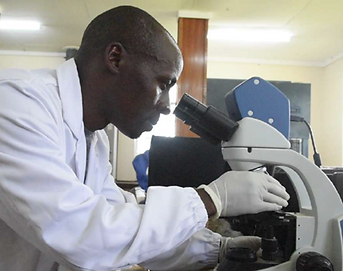Enhancing Bambara groundnut for Fusarium wilt resistance and improved agronomic traits

Egerton University,
Egerton, Kenya

From left to right: Mr Rodricks Rono (student), Felister Nzuve, Justus Obara, Pascal Ojwang and Wycliff Maranga (technician)
PROJECT OVERVIEW
Background
In Kenya, Bambara groundnut is predominantly grown in the western region and is potentially a key food security crop. Unlocking the potential of such locally adapted food crop varieties, would help avert the risk of food insecurity. Currently, there is no active breeding programme on Bambara in Kenya. Farmers largely grow land-races (local varieties) obtained from the informal seed systems which contributes to low productivity.
The project will create diverse impacts in Kenya, the sub-Saharan region. The development of improved varieties of Bambara groundnut and subsequent transfer to farmers through formal seed systems will improve food, nutrition security and livelihood among farming communities in sub-Saharan Africa (SSA). Incorporating Bambara groundnut into cereal cropping systems will also promote sustainable farming practices that will improve soil fertility in Kenya. Embracing resilience to climate change food systems through promoting production of adapted crops will supplement major staple food production.

Dr Justus Obara in the lab at Egerton University.
Objectives
-
To identify, isolate and characterize the genome diversity of host specific strains of Fusarium oxysporum in Bambara groundnut
-
To determine Fusarium wilt resistant Bambara genotypes under greenhouse conditions.
PROJECT TEAM

Dr Justus Obara
PI,
Egerton University, Kenya

Mr Maranga Wycliff
Field Technician,
Molecular Biology and Plant Pathology

Dr Pascal Ojwang
Co-PI,

Dr Fellister Nzuve
Co-PI,


